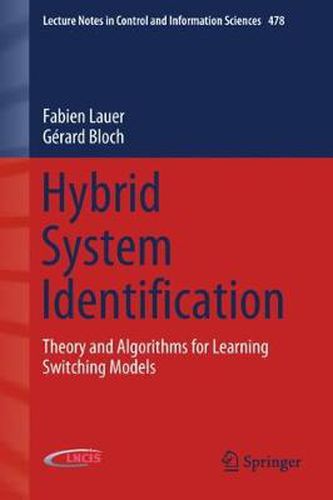Readings Newsletter
Become a Readings Member to make your shopping experience even easier.
Sign in or sign up for free!
You’re not far away from qualifying for FREE standard shipping within Australia
You’ve qualified for FREE standard shipping within Australia
The cart is loading…






This title is printed to order. This book may have been self-published. If so, we cannot guarantee the quality of the content. In the main most books will have gone through the editing process however some may not. We therefore suggest that you be aware of this before ordering this book. If in doubt check either the author or publisher’s details as we are unable to accept any returns unless they are faulty. Please contact us if you have any questions.
Hybrid System Identification helps readers to build mathematical models of dynamical systems switching between different operating modes, from their experimental observations. It provides an overview of the interaction between system identification, machine learning and pattern recognition fields in explaining and analysing hybrid system identification. It emphasises the optimization and computational complexity issues that lie at the core of the problems considered and sets them aside from standard system identification problems. The book presents practical methods that leverage this complexity, as well as a broad view of state-of-the-art machine learning methods. The authors illustrate the key technical points using examples and figures to help the reader understand the material. The book includes an in-depth discussion and computational analysis of hybrid system identification problems, moving from the basic questions of the definition of hybrid systems and system identification to methods of hybrid system identification and the estimation of switched linear/affine and piecewise affine models. The authors also give an overview of the various applications of hybrid systems, discuss the connections to other fields, and describe more advanced material on recursive, state-space and nonlinear hybrid system identification. Hybrid System Identification includes a detailed exposition of major methods, which allows researchers and practitioners to acquaint themselves rapidly with state-of-the-art tools. The book is also a sound basis for graduate and undergraduate students studying this area of control, as the presentation and form of the book provides the background and coverage necessary for a full understanding of hybrid system identification, whether the reader is initially familiar with system identification related to hybrid systems or not.
$9.00 standard shipping within Australia
FREE standard shipping within Australia for orders over $100.00
Express & International shipping calculated at checkout
This title is printed to order. This book may have been self-published. If so, we cannot guarantee the quality of the content. In the main most books will have gone through the editing process however some may not. We therefore suggest that you be aware of this before ordering this book. If in doubt check either the author or publisher’s details as we are unable to accept any returns unless they are faulty. Please contact us if you have any questions.
Hybrid System Identification helps readers to build mathematical models of dynamical systems switching between different operating modes, from their experimental observations. It provides an overview of the interaction between system identification, machine learning and pattern recognition fields in explaining and analysing hybrid system identification. It emphasises the optimization and computational complexity issues that lie at the core of the problems considered and sets them aside from standard system identification problems. The book presents practical methods that leverage this complexity, as well as a broad view of state-of-the-art machine learning methods. The authors illustrate the key technical points using examples and figures to help the reader understand the material. The book includes an in-depth discussion and computational analysis of hybrid system identification problems, moving from the basic questions of the definition of hybrid systems and system identification to methods of hybrid system identification and the estimation of switched linear/affine and piecewise affine models. The authors also give an overview of the various applications of hybrid systems, discuss the connections to other fields, and describe more advanced material on recursive, state-space and nonlinear hybrid system identification. Hybrid System Identification includes a detailed exposition of major methods, which allows researchers and practitioners to acquaint themselves rapidly with state-of-the-art tools. The book is also a sound basis for graduate and undergraduate students studying this area of control, as the presentation and form of the book provides the background and coverage necessary for a full understanding of hybrid system identification, whether the reader is initially familiar with system identification related to hybrid systems or not.